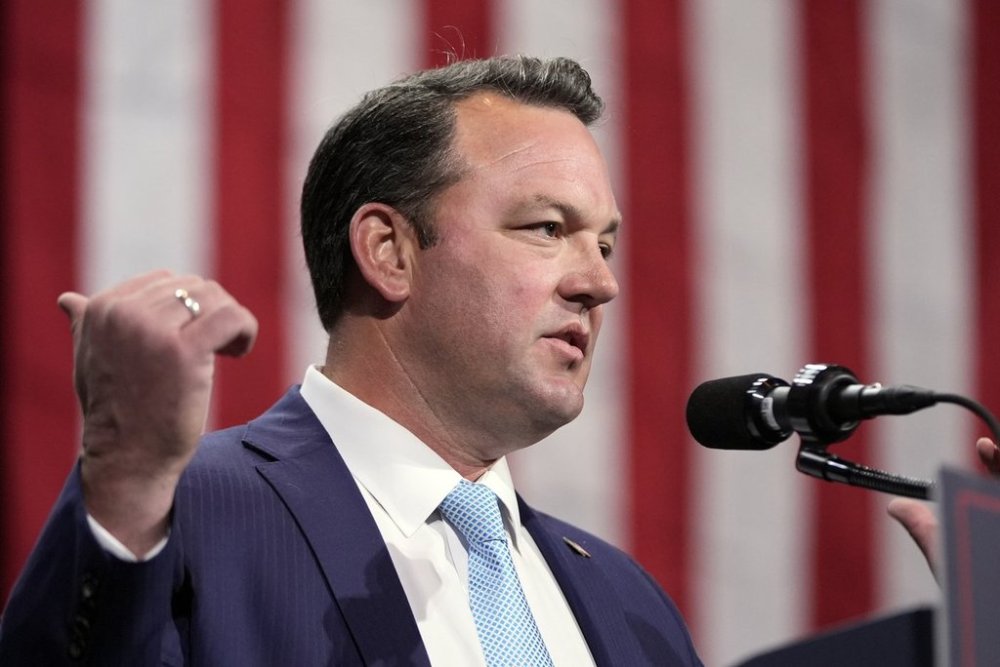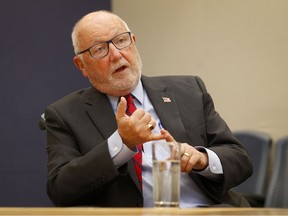World
Georgia Republicans Aim to Eliminate State Income Tax Ahead of 2026 Election

As the 2026 election approaches, Georgia Republicans are actively discussing plans to eliminate the state’s personal income tax. This initiative was explored during a meeting on Tuesday, where prominent Republican figures gathered to strategize on how this significant tax reform could reshape the state’s financial landscape.
Leading the discussions was Burt Jones, the current lieutenant governor, who is running for governor with the endorsement of former President Donald Trump. Jones emphasized the need for Georgia to maintain its competitive edge in attracting businesses. “If we want to continue to stay competitive in the state of Georgia and continue to be the number one state to do business, we’ve got to be looking for ways to keep us competitive,” he stated.
Supporters of the proposal, including members of the committee, argue that eliminating the income tax would benefit working families and small businesses. They cited insights from Grover Norquist, president of Americans for Tax Reform, who is a well-known advocate for tax cuts. Currently, eight states, including Florida and Tennessee, do not impose a personal income tax, according to data from the Tax Foundation. Other states, such as North Carolina and Louisiana, have either reduced their income tax rates or are moving towards eliminating them entirely.
Opposition from Democrats is strong, with concerns that the elimination of the income tax would disproportionately benefit wealthy individuals at the expense of lower-income citizens. Sen. Nan Orrock, a Democrat from Atlanta, argued that this move could undermine essential state services by reducing revenue. “I can go on and on with needs that we have now in many areas that would argue for having a robust revenue to meet the needs of our citizens,” she noted, highlighting potential adverse impacts on funding for education and social services.
Norquist countered these concerns, stating that states often see an increase in overall revenue following tax cuts. He claimed that lower income taxes attract businesses and residents, ultimately leading to more investments and higher tax revenues, albeit at reduced rates. “When you attract more people into the state and more investment into the state, you end up with both more money for individuals but also more tax revenue at lower rates,” he said.
In a related context, Georgia Governor Brian Kemp recently enacted income tax rebates of up to $500 and reduced the tax rate to 5.19% for all income earned in 2025. This is part of a broader strategy to decrease Georgia’s income tax rate to 4.99%, potentially as early as next year. The legislation also transitioned the state from a tiered tax bracket system to a flat income tax model.
Tax rebates have been feasible due to Georgia’s substantial budget surplus in recent years. However, research from the Institute on Taxation and Economic Policy indicates that two-thirds of the benefits from income tax cuts primarily favor the highest-earning 20% of Georgians, raising concerns about equity. Republicans argue that this outcome is expected since many individuals in the lowest income bracket are already exempt from state income taxes.
Democratic candidates for governor have not entirely dismissed the idea of tax reductions. Former Atlanta Mayor Keisha Lance Bottoms has proposed eliminating the state income tax for public school teachers but warned that a complete elimination would negatively impact school funding and increase financial burdens on lower-income families.
As discussions continue, Republican lawmakers remain optimistic about advancing their agenda. Sen. Blake Tillery, chairman of the Appropriations Committee and a candidate for lieutenant governor, stated, “While the mechanics are up for debate, I think it’s clear that the end goal is not,” indicating a unified commitment to exploring tax reform options.
The ongoing dialogue around income tax elimination reflects broader trends in state tax policies and the competitive landscape for attracting businesses and residents, setting the stage for a contentious political battle as the 2026 election draws nearer.
-

 Politics1 month ago
Politics1 month agoSecwepemc First Nation Seeks Aboriginal Title Over Kamloops Area
-

 World5 months ago
World5 months agoScientists Unearth Ancient Antarctic Ice to Unlock Climate Secrets
-

 Entertainment5 months ago
Entertainment5 months agoTrump and McCormick to Announce $70 Billion Energy Investments
-

 Lifestyle5 months ago
Lifestyle5 months agoTransLink Launches Food Truck Program to Boost Revenue in Vancouver
-

 Science5 months ago
Science5 months agoFour Astronauts Return to Earth After International Space Station Mission
-

 Lifestyle3 months ago
Lifestyle3 months agoManitoba’s Burger Champion Shines Again Amid Dining Innovations
-

 Technology3 months ago
Technology3 months agoApple Notes Enhances Functionality with Markdown Support in macOS 26
-

 Top Stories2 months ago
Top Stories2 months agoUrgent Update: Fatal Crash on Highway 99 Claims Life of Pitt Meadows Man
-

 Top Stories2 weeks ago
Top Stories2 weeks agoHomemade Houseboat ‘Neverlanding’ Captivates Lake Huron Voyagers
-

 Politics4 months ago
Politics4 months agoUkrainian Tennis Star Elina Svitolina Faces Death Threats Online
-

 Sports5 months ago
Sports5 months agoSearch Underway for Missing Hunter Amid Hokkaido Bear Emergency
-

 Politics5 months ago
Politics5 months agoCarney Engages First Nations Leaders at Development Law Summit





















